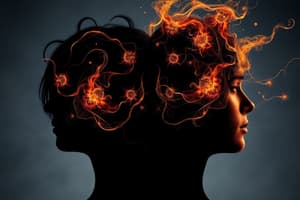Podcast
Questions and Answers
What are the three components of the tripartite model of attitude structure?
What are the three components of the tripartite model of attitude structure?
- Affective, behavioural, cognitive (correct)
- Behavioural, emotional, rational
- Cognitive, social, emotional
- Affective, cognitive, emotional
Which response is NOT typically associated with cognitive dissonance?
Which response is NOT typically associated with cognitive dissonance?
- Rationalisation
- Avoidance
- Increase cognitive load (correct)
- Change beliefs
What does situational attribution refer to in attribution theory?
What does situational attribution refer to in attribution theory?
- Considering external circumstances as influencing behavior (correct)
- Blaming personal characteristics for behavior
- Assuming behavior is a result of past experiences
- Associating behavior with societal norms
In social identity theory, what is the first step in the process of social categorisation?
In social identity theory, what is the first step in the process of social categorisation?
According to Festinger's theory of cognitive dissonance, increasing the magnitude of cognitive dissonance results in which of the following?
According to Festinger's theory of cognitive dissonance, increasing the magnitude of cognitive dissonance results in which of the following?
What is the outcome of cognitive dissonance when an individual rationalizes their behavior?
What is the outcome of cognitive dissonance when an individual rationalizes their behavior?
Which aspect of the tripartite model directly relates to an individual's emotional response?
Which aspect of the tripartite model directly relates to an individual's emotional response?
In attribution theory, what distinguishes dispositional attributions from situational attributions?
In attribution theory, what distinguishes dispositional attributions from situational attributions?
What mechanism is primarily used to manage feelings of cognitive dissonance?
What mechanism is primarily used to manage feelings of cognitive dissonance?
In social identity theory, what process involves individuals defining themselves in relation to groups?
In social identity theory, what process involves individuals defining themselves in relation to groups?
Flashcards are hidden until you start studying
Study Notes
Functions of Attitudes
- Implicit attitudes are automatic and unconscious, while explicit attitudes are conscious and deliberate.
- Attitudes can influence behavior, often determining responses to various situations.
Tripartite Model of Attitude Structure
- Affective component: Involves feelings and emotions toward an object or person.
- Behavioral component: Relates to how attitudes influence actions and behaviors.
- Cognitive component: Involves beliefs and thoughts about the object or person.
Effect of Attitudes on Behavior
- Attitudes can guide behaviors and decision-making processes.
Theory of Cognitive Dissonance – Festinger
- Cognitive dissonance occurs when there is a conflict between beliefs, attitudes, or behaviors, leading to discomfort.
- People tend to avoid situations that cause dissonance, reduce dissonance through changes, or rationalize behaviors to align with beliefs.
- Magnitude of dissonance is influenced by the importance of the conflicting beliefs or behaviors.
- Responses to cognitive dissonance can include:
- Changing beliefs to reduce discomfort.
- Altering behaviors to align with beliefs.
- Adjusting perceptions of the action to alleviate conflict.
- Study by Festinger and Carlsmith (1959) explored cognitive consequences of forced compliance, showing how dissonance influences attitudes.
Attribution Theory
- Explains behavior through two main types of attributions:
- Situational attributions: Explains behavior based on external factors and circumstances.
- Dispositional attributions: Attributes behavior to internal characteristics or personality traits.
Social Identity Theory – Tajfel and Turner (1979)
- Social categorization: The process of grouping individuals into social categories based on shared characteristics.
- Social identification: The process by which individuals identify with a particular group, influencing self-esteem and behavior.
- Social comparison: Evaluating one's group by comparing it with others, often leading to favoring one's own group over others.
Functions of Attitudes
- Implicit attitudes are automatic and unconscious, while explicit attitudes are conscious and deliberate.
- Attitudes can influence behavior, often determining responses to various situations.
Tripartite Model of Attitude Structure
- Affective component: Involves feelings and emotions toward an object or person.
- Behavioral component: Relates to how attitudes influence actions and behaviors.
- Cognitive component: Involves beliefs and thoughts about the object or person.
Effect of Attitudes on Behavior
- Attitudes can guide behaviors and decision-making processes.
Theory of Cognitive Dissonance – Festinger
- Cognitive dissonance occurs when there is a conflict between beliefs, attitudes, or behaviors, leading to discomfort.
- People tend to avoid situations that cause dissonance, reduce dissonance through changes, or rationalize behaviors to align with beliefs.
- Magnitude of dissonance is influenced by the importance of the conflicting beliefs or behaviors.
- Responses to cognitive dissonance can include:
- Changing beliefs to reduce discomfort.
- Altering behaviors to align with beliefs.
- Adjusting perceptions of the action to alleviate conflict.
- Study by Festinger and Carlsmith (1959) explored cognitive consequences of forced compliance, showing how dissonance influences attitudes.
Attribution Theory
- Explains behavior through two main types of attributions:
- Situational attributions: Explains behavior based on external factors and circumstances.
- Dispositional attributions: Attributes behavior to internal characteristics or personality traits.
Social Identity Theory – Tajfel and Turner (1979)
- Social categorization: The process of grouping individuals into social categories based on shared characteristics.
- Social identification: The process by which individuals identify with a particular group, influencing self-esteem and behavior.
- Social comparison: Evaluating one's group by comparing it with others, often leading to favoring one's own group over others.
Studying That Suits You
Use AI to generate personalized quizzes and flashcards to suit your learning preferences.



